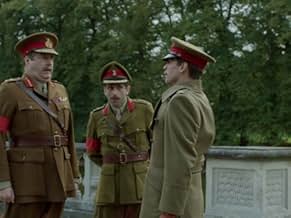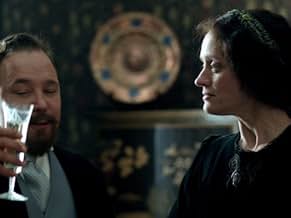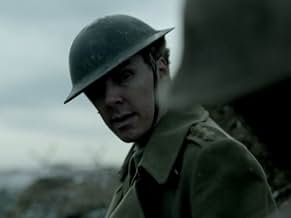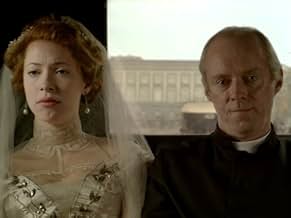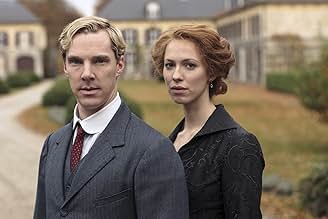VALUTAZIONE IMDb
7,4/10
11.019
LA TUA VALUTAZIONE
Aggiungi una trama nella tua linguaRevolves around a love triangle between a conservative English aristocrat, his mean socialite wife and a young suffragette.Revolves around a love triangle between a conservative English aristocrat, his mean socialite wife and a young suffragette.Revolves around a love triangle between a conservative English aristocrat, his mean socialite wife and a young suffragette.
- Candidato a 5 Primetime Emmy
- 8 vittorie e 36 candidature totali
Sfoglia gli episodi
Recensioni in evidenza
I'm sure that HBO marketing execs were relieved that, if they were going to get behind a 5-part series based on Ford Madox Ford's complex and not terribly well known 20th-century masterpiece, at least some of it would be set in a stately home in the north of England, like that other show about the downtown abbey.
Ford's a great one for interior monologue and multiple points of view and such, but Tom Stoppard's masterly adaptation channels the great muddy river of his prose into a lively, involving narrative—though there's still enough time-shifting and flashbacking, even some Eisenstein-style montage, to do honor to Ford's avant-garde intentions. Considering what difficult material he's dealing with, it's one of the best TV adaptations ever!
Benedict Cumberbatch has always done well in period films, and he seems like the only possible choice for Christopher Tietjens, a self-styled 18th-century gentleman (the time period of the series is roughly 1908-19) and omniscient civil servant, but obstinate, brusque and arrogant as well (maybe even a little like Sherlock?). Rebecca Hall is riveting and surprisingly sympathetic as Tietjens's deceitful wife, Sylvia, and Aussie actress Adelaide Clemens is a revelation as Valentine, the virginal suffragette he meets and falls in love with in two of the series's most powerful scenes. (Tietjens and Sylvia, though usually at cross-purposes, are determined not to divorce—it's complicated .)
Tietjens is described by one of his wife's admirers as a "bloody great bolster" of a man—BC didn't have time to bulk up for the part, obviously—but he emerges as a poignant, even romantic, figure, with only the memory of the night he falls in love with Valentine to sustain him through six years of frustration, disappointment and danger. Perhaps it's easy to see why some viewers didn't find this storyline or this character very "relatable."
Long story short, '"Parade's End" isn't as accessible as an original costume drama devised for a contemporary audience, like "Downton," but it's decidedly worth watching. We didn't have a problem with BC's enunciation, but some of the dialogue, especially in the scenes with excited Welsh soldiers in the trenches, is admittedly not so easy to follow. (Next time we'll try the subtitles.) Great cinematography; kudos to the first-rate British cast, with special mention to Stephen Graham as Tietjens's fair-weather friend Macmasters and Rufus Sewell in a Pythonesque turn as a sex-crazed clergyman. An interview with Stoppard on disc two sheds some light on his process.
Ford's a great one for interior monologue and multiple points of view and such, but Tom Stoppard's masterly adaptation channels the great muddy river of his prose into a lively, involving narrative—though there's still enough time-shifting and flashbacking, even some Eisenstein-style montage, to do honor to Ford's avant-garde intentions. Considering what difficult material he's dealing with, it's one of the best TV adaptations ever!
Benedict Cumberbatch has always done well in period films, and he seems like the only possible choice for Christopher Tietjens, a self-styled 18th-century gentleman (the time period of the series is roughly 1908-19) and omniscient civil servant, but obstinate, brusque and arrogant as well (maybe even a little like Sherlock?). Rebecca Hall is riveting and surprisingly sympathetic as Tietjens's deceitful wife, Sylvia, and Aussie actress Adelaide Clemens is a revelation as Valentine, the virginal suffragette he meets and falls in love with in two of the series's most powerful scenes. (Tietjens and Sylvia, though usually at cross-purposes, are determined not to divorce—it's complicated .)
Tietjens is described by one of his wife's admirers as a "bloody great bolster" of a man—BC didn't have time to bulk up for the part, obviously—but he emerges as a poignant, even romantic, figure, with only the memory of the night he falls in love with Valentine to sustain him through six years of frustration, disappointment and danger. Perhaps it's easy to see why some viewers didn't find this storyline or this character very "relatable."
Long story short, '"Parade's End" isn't as accessible as an original costume drama devised for a contemporary audience, like "Downton," but it's decidedly worth watching. We didn't have a problem with BC's enunciation, but some of the dialogue, especially in the scenes with excited Welsh soldiers in the trenches, is admittedly not so easy to follow. (Next time we'll try the subtitles.) Great cinematography; kudos to the first-rate British cast, with special mention to Stephen Graham as Tietjens's fair-weather friend Macmasters and Rufus Sewell in a Pythonesque turn as a sex-crazed clergyman. An interview with Stoppard on disc two sheds some light on his process.
The show was a very intelligent yet slow paced adaptation of very high quality source material. Sometimes I got impatient in certain episodes, but am glad that I stayed the course. Benedict cumberbatch was OUTSTANDING in the role. Just brilliant. His expressions, that quiver of emotion...it said much more than words. There were some deep moments, very poignant as well. Some witty ones also. I would have rated it 7.5 if option was there. Just stay with this show, it will be a rewarding experience.
Before "Parade's End," Rebecca Hall and Benedict Cumberbatch were last paired professionally in an unassuming romantic comedy called "Starter for 10," a film anchored by their friend James McAvoy. All three played university students. Although each turned in a good performance, the roles were not ones that required much acting range. In Parade's End, however, the roles of Sylvia and Christopher Tietjens allow both Hall and Cumberbatch to flex their considerable acting muscles. When both are in a scene, the scene is so riveting that it is hard to know which actor to watch.
Over the years, the 36-year-old Cumberbatch has built an impressive portfolio of work. He has been accurately described as a chameleon. He so completely invests himself in a role that it is sometimes hard to recognize the actor behind the character.
As Sylvia Tietjens, wife of wealthy landowner Christopher Tietjens, Hall holds her own against Cumberbatch. Her Sylvia is smart, narcissistic, beautiful, lusty, manipulative, and utterly fascinating. Her rival, suffragette Valentine Wannop, pales in comparison. While the younger Valentine is sweet, loyal, and plucky, she doesn't have Sylvia's fire.
Which woman will Christopher choose? You'll have to watch the series to find out. Along the way, you'll enjoy not only the performances of the three principal actors, but also the performances of a wonderful ensemble of able actors, including Rupert Everett, Anne-Marie Duff (coincidentally, the wife of James McAvoy, who joined Hall and Cumberbatch in "Starter for 10"), and others.
Over the years, the 36-year-old Cumberbatch has built an impressive portfolio of work. He has been accurately described as a chameleon. He so completely invests himself in a role that it is sometimes hard to recognize the actor behind the character.
As Sylvia Tietjens, wife of wealthy landowner Christopher Tietjens, Hall holds her own against Cumberbatch. Her Sylvia is smart, narcissistic, beautiful, lusty, manipulative, and utterly fascinating. Her rival, suffragette Valentine Wannop, pales in comparison. While the younger Valentine is sweet, loyal, and plucky, she doesn't have Sylvia's fire.
Which woman will Christopher choose? You'll have to watch the series to find out. Along the way, you'll enjoy not only the performances of the three principal actors, but also the performances of a wonderful ensemble of able actors, including Rupert Everett, Anne-Marie Duff (coincidentally, the wife of James McAvoy, who joined Hall and Cumberbatch in "Starter for 10"), and others.
I personally doubt that keywords such as 'love triangle' or 'suffragette' do any justice to this excellent rendition of Ford's novel. Christopher Tietjens' so very noble, honorable and occasionally heroic behaviour in every aspect of his intentions and actions, as well as the overall background of WWI petty intrigues, the so vivid rendition of the atrocious human suffering & desperation on the front line are the true show stealer. Excellent performances by all cast, in particular Benedict Cumberbatch (huge in his role !!!), Rebecca Hall and Adelaide Clemens... Oops ! This is the very 'love triangle' I was arguing against just a few seconds ago... One more actor who's absolutely perfect in his role is Roger Allam, as General Campion. Drawing the line: viewers of all ages and every level of education should find this series to match every bit of their expectations... Irrespective whether these rather look towards the 'love triangle'... or they go much deeper into psychoanalysis of intimate family, friendship, love relations or the noblesse of human behaviour under deeply stressful conditions. Today's human society is in serious need of individuals such as Christopher Tietjens... (not really the 'last' parade... I hope...). Highly recommended, absolutely nothing is obsolete or worthless in this movie rendition of British society during the WWI years !
Not since A Dance to the Music of Time has such a stellar cast been allied to such an artful and unusual script.
Ford Madox Ford is not a popular novelist. His work often approaches its subjects on an elliptical curve, his principal characters are seldom in the mainstream of society, forming odd relationships, requiring his audience to assimilate their understanding of them over the course of a whole work rather than categorise from their experience (or jump to conclusions based on genre). This explains why we don't see his work adapted very often. Or even at all.
Susanna White and Tom Stoppard have both grasped the nettle of demonstrating this sideways approach, though I'm not sure quite so many kaleidoscopic shots were necessary to drive the point home. Benedict Cumberbatch joins in, underlining his character's isolation with some rather off-putting facial gestures. Ronald Hines played Tietjens in the now lost 1960's adaptation and casting to type may have worked better than struggling with toning down the matinée idol status Cumberbatch has acquired since hitting Sherlock Holmes out of the park. Maybe if he and Stephen Graham had swapped roles the other characters might have found it easier to deal with Tietjens' self-enforced oddity but that may have impaired Ford's central point, beautifully delivered as the the climax to Episode 4.
But acting idiosyncrasies cannot mask the quality of the fabulous script or the overall adaptation which has a towering performance from Rebecca Hall and glittering additions from Rufus Sewell, Rupert Everett, Miranda Richardson, Roger Allam, Ann-Marie Duff and beautiful, note-perfect newcomer Adele Clemens.
With so much glossy soap about, it is extremely refreshing to have high quality, thought-provoking, challenging drama this good whatever the lead chooses to do with his jaw muscles.
A keeper.
Ford Madox Ford is not a popular novelist. His work often approaches its subjects on an elliptical curve, his principal characters are seldom in the mainstream of society, forming odd relationships, requiring his audience to assimilate their understanding of them over the course of a whole work rather than categorise from their experience (or jump to conclusions based on genre). This explains why we don't see his work adapted very often. Or even at all.
Susanna White and Tom Stoppard have both grasped the nettle of demonstrating this sideways approach, though I'm not sure quite so many kaleidoscopic shots were necessary to drive the point home. Benedict Cumberbatch joins in, underlining his character's isolation with some rather off-putting facial gestures. Ronald Hines played Tietjens in the now lost 1960's adaptation and casting to type may have worked better than struggling with toning down the matinée idol status Cumberbatch has acquired since hitting Sherlock Holmes out of the park. Maybe if he and Stephen Graham had swapped roles the other characters might have found it easier to deal with Tietjens' self-enforced oddity but that may have impaired Ford's central point, beautifully delivered as the the climax to Episode 4.
But acting idiosyncrasies cannot mask the quality of the fabulous script or the overall adaptation which has a towering performance from Rebecca Hall and glittering additions from Rufus Sewell, Rupert Everett, Miranda Richardson, Roger Allam, Ann-Marie Duff and beautiful, note-perfect newcomer Adele Clemens.
With so much glossy soap about, it is extremely refreshing to have high quality, thought-provoking, challenging drama this good whatever the lead chooses to do with his jaw muscles.
A keeper.
Lo sapevi?
- QuizBenedict Cumberbatch claimed that his character of Christopher Tietjen was one of the more admirable he has ever played. He claimed "[Christopher] has many admirable qualities I'd like to siphon off into my life."
- BlooperSylvia and Bobbie smoke cigarettes, but several others certainly would have been smokers, including the Ladies Macmaster, Wonnop, Satterthwaite, Marie-Leonie, and Claudine.
- ConnessioniFeatured in The Wright Stuff: Episodio #17.165 (2012)
I più visti
Accedi per valutare e creare un elenco di titoli salvati per ottenere consigli personalizzati
- How many seasons does Parade's End have?Powered by Alexa
Dettagli
- Data di uscita
- Paesi di origine
- Lingua
- Celebre anche come
- Geçit Töreni Sonu
- Luoghi delle riprese
- Duncombe Park, Helmsley, York, North Yorkshire, Inghilterra, Regno Unito(Groby Hall: Tietjens family's country estate)
- Aziende produttrici
- Vedi altri crediti dell’azienda su IMDbPro
Contribuisci a questa pagina
Suggerisci una modifica o aggiungi i contenuti mancanti

Divario superiore
By what name was Parade's End (2012) officially released in India in English?
Rispondi

